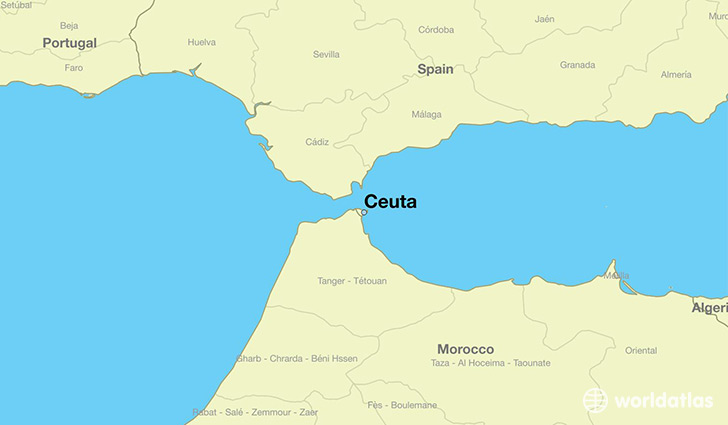by Hugh Fitzgerald

From Morocco, thousands of undocumented migrants from sub-Saharan Africa have been flooding into Spain: some twenty-three thousand in the first six months of this year. And they have done it without leaving the continent of Africa. Their preferred point of entry into Europe is Ceuta, one of two Spanish enclaves — the other is Melilla — where, if they manage merely to set foot, they are considered to have made it “to Europe” and cannot be repatriated. They are home free, by the laws — crazed laws — of the E.U. Take one step on the African soil of Ceuta, and you have made it to Europe. Tens of thousands of them arrive in Morocco, hoping for a chance to try (and re-try) their luck at the security fence around Ceuta. They settle in Moroccan cities — Tetouan, Fez, Meknes — where they live among the poorer Moroccan Arabs, who regard the black Africans with evident contempt, and with whom there are often street battles. And the migrants wait.
Why has Ceuta suddenly become such an important point of entry? Until recently, sub-Saharan and North African migrants would leave for Europe from Libyan ports, with Italy as their destination. Often they would set sail in unseaworthy boats — the Arabs smuggling them in didn’t care, once they had been paid, whether their passengers lived or died, in some cases setting the boats adrift on the high seas. In case of trouble, they could count on being rescued by European ships and brought to Italian ports, where they were allowed to disembark. But that route is no longer possible. Under Minister of the Interior Mario Salvini, Italy no longer allows these boats to land, does not engage in rescue operations, and makes surer to turn away these economic migrants.
If Italy has become unwelcoming to such migrants, the new Socialist government of Pedro Sanchez, that took over in Spain at the beginning of this year, has become far more welcoming. When the Italians turned away the Aquarius, with more than 600 migrants aboard, a ship that had rescued sub-Saharan, and some Arab, economic migrants, from the six unseaworthy boats they had originally set off in from Libya for Italy, Spain stepped in and allowed the Aquarius and two Italian navy vessels to unload their human cargo this past June in Valencia. Now that it is clear that Salvini will not relent, all those sub-Saharan migrants trying to make it to Europe see their best hope lies in first getting to Morocco, then scaling the fence in Ceuta, which means they are in Spain itself, and cannot be turned back.
Recently there have been waves of these migrants attempting to scale the Ceuta fence by the hundreds — in one case, 600 made it over. Their modus operandi is always the same: they throw containers of feces, blood, quick lime, and battery acid at the Spanish guards. They come armed with wire cutters. And there’s no more barbed wire. Welcome to Europe! After all, they are migrants; they are poor; they want, and therefore they deserve, more than has so far been their lot in life; we have to understand their plight. We dare not turn them away; it would be un-Christian. Pope Francis has said so. Once they are in Ceuta, they ululate and scream and caterwaul in delight, kissing the ground, convinced that they have made it to the promised land, where they will be taken care of, and in a sense, they have. They cannot be repatriated, and once in Ceuta, and then in mainland Spain, they can take advantage of the largesse that the socialist government has ready for them — free housing, free medical care, free education and vocational training (not that many have shown an interest in becoming employed). And if they manage to get married or have a wife or wives follow them, they can receive family allowances — all the bounty that Europeans, for reasons I do not understand, seem to think they owe these people who throw feces, blood, acid, and quicklime on Spanish guards as their first act of fealty to Spain. Furthermore, once they are in Spain, some will find a way to move on to richer countries — Germany, Sweden — where they can obtain even more by way of welfare benefits of every conceivable kind. Manna from heaven. You need not do anything to deserve it. You need simply be.
- Like
- Digg
- Del
- Tumblr
- VKontakte
- Buffer
- Love This
- Odnoklassniki
- Meneame
- Blogger
- Amazon
- Yahoo Mail
- Gmail
- AOL
- Newsvine
- HackerNews
- Evernote
- MySpace
- Mail.ru
- Viadeo
- Line
- Comments
- Yummly
- SMS
- Viber
- Telegram
- Subscribe
- Skype
- Facebook Messenger
- Kakao
- LiveJournal
- Yammer
- Edgar
- Fintel
- Mix
- Instapaper
- Copy Link









